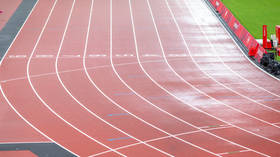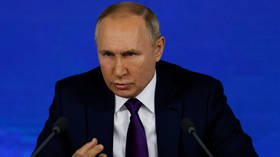Scientists appeal to IOC over transgender guidance

A lineup of 38 medical experts and sports insiders have signed a statement criticizing the International Olympic Committee's (IOC) new framework on transgender athletes, issuing a warning over fairness as part of the debate.
After pledging to revise the guidelines amid fierce controversy over the issue at the Olympic Games in 2021, the governing body concluded that trans women would not be required to lower their testosterone to compete against rivals born as women – one of the cornerstones of the row for those who argue that transitioned athletes have an advantage over their opponents.
The reappraisal appeared to have been partly made in response to high-profile cases including Laurel Hubbard, the New Zealander who briefly competed at the Games in super-heavyweight weighlifting.
Testosterone level regulations have come in for further questioning because of the rise of Lia Thomas, a former male competitor who has broken records at college level as a female swimmer in the US in recent months.
Some campaigners for a change to the rules have suggested that groups and individuals are afraid to speak out publicly because they fear repercussions from others who passionately claim that more restrictive measures threaten the basic rights of transgender athletes.
Now the group of scientists and sports professionals, including members of World Athletics and World Triathlon, have written to the IOC to say that the framework is more focused on inclusion than science around gender and performance.
The authors, who are said to be associated with the International Federation of Sports Medicine and European Federation of Sports Medicine Associations, appealed to the IOC to revisit the guidance in the British Medical Journal Open Science & Exercise Medicine.
They say that the presumption of transgender athletes having no presumed advantage offers a "stark contrast" to the previous ruling by the IOC in 2015, scientific evidence and the findings of various groups and research.
Trans women could be allowed to compete in female sport, the scientists say, by lowering testosterone.
Thomas took testosterone suppressants for a year before being backed by the National Collegiate Athletic Association in the US to compete.
Cycling and rowing chiefs are among the leaders urging the IOC to set standards based on fairness and science.
'the IOC’s new position that there should be “no presumption of performance advantage” for trans women “is in stark contrast with the outcome of the 2015 IOC consensus, the scientific evidence, and the subsequent assessment of numerous sports medicine associations/commissions”.'
— Cathy Devine (@cathydevine56) January 18, 2022
Given that sexed bodies have fundamental physical and physiological differences, does it even make sense to talk about the 'right' levels?
— Non-dairy Canary (@NonDairyCanary) January 16, 2022
While some scientists argue that the evidence around transgender athletes having advantages is inconclusive, others are convinced that trans individuals benefit in competition when they are born as men, with many going through puberty before transitioning.
Professor Jurgen Steinacker told Sportsmail that transwomens' choices to compete should be respected but that fairness had to be "bi-directional".
"In this case, I think what they are doing is unfair on females," the chair of World Rowing’s Sports Medicine Commission said.
"Sport is inclusive but it is inclusive until it comes to winning medals. If you want to compete as a female in sport, you face biological disadvantages compared to cisgender males that must be mitigated against.
"We need to set a limit that respects the right of females to compete on equal terms. If you create a definition of gender that is based on social rather than biological differences, then you effectively destroy the female category."
Unlike the 2015 guidelines Policies will NOW need to be based systematic and rigorous research. Rightly so the onus is more clearly on the international federations to develop new criteria that align with their unique requirements and balance fairness and inclusion.
— Kirsti Miller (@KirstiMiller30) January 18, 2022
In fact, there is no clear biological list of features that allow us to even remotely cleanly separate men from women.Chromosomes? NOPETestosterone? NOPEHeight? NOPEVo2 Max? NOPEWeight? NOPEBone Density? NOPE
— Kirsti Miller (@KirstiMiller30) January 18, 2022
Professor Steinacker's remarks echoed the views of a reported letter from parents of Thomas's rivals which warned that the integrity of women's sports is at risk over the issue.
Former international pentathlete Kirsti Miller, who competed for Australia and later revealed she was transgender while working at a jail in 2000, issued a lengthy social media response to one report of the petition.
Miller said that the last nine Olympic Games had featured two openly transgender athletes, neither of whom threatened to earn a medal.
"Sadly, [one report of the petition] still doesn't get that there is no relationship between unaltered endogenous testosterone in males or females and sport performance," she claimed.
"In fact, there is no clear biological list of features that allow us to even remotely cleanly separate men from women."
Lawsuits in several US states have achieved varying levels of success in bids to bar transgender athletes from competing in female college sports.
The new IOC framework is set to be implemented after the Winter Olympic Games in Beijing, which run from February 4-20 2022.















